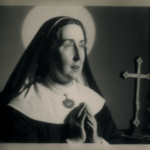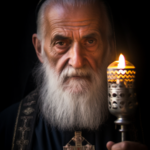St. Richard of Wyche
St. Richard of Wyche
When they lived:
St. Richard of Wyche, also known as Saint Richard of Chichester, lived during the late 12th and early 13th centuries. He was born in 1197 in Droitwich, England, and passed away on April 3, 1253, in Dover, England.
Where they lived:
St. Richard primarily lived in England during a tumultuous period in the country’s history.
Notable world events during the time of their life:
- Magna Carta (1215): During St. Richard’s lifetime, the Magna Carta was sealed by King John of England in 1215. This historic document laid the foundation for the principles of constitutional law, limiting the power of the monarchy and establishing certain rights and liberties for the people.
- Albigensian Crusade (1209-1229): This was a significant religious and political conflict in southern France. It was a part of the larger Albigensian heresy, where the Catholic Church sought to suppress the Cathar movement. St. Richard’s life would have been influenced by the wider struggles within the Catholic Church.
- Fourth Lateran Council (1215): This ecumenical council, convened by Pope Innocent III, addressed various issues within the Catholic Church, including matters of doctrine and discipline. It played a pivotal role in shaping the Church’s institutional framework and theology during St. Richard’s time.
- Innocent III’s Papacy: Pope Innocent III, who served from 1198 to 1216, was a powerful and influential figure in the Catholic Church. His papacy witnessed significant developments in canon law, theology, and church-state relations.
- The Mongol Empire’s Expansion (Early 13th Century): During St. Richard’s lifetime, the Mongol Empire, led by Genghis Khan and his successors, was rapidly expanding across Asia and into Eastern Europe. This marked a significant shift in the global balance of power.
Their patronage:
St. Richard of Wyche is the patron saint of several noteworthy causes and groups:
- Patron Saint of Sussex: St. Richard is revered as the patron saint of Sussex, a county in southern England. He is deeply respected by the local population for his piety and contributions to the region.
- Patron Saint of Coachmen and Laborers: St. Richard is also the patron saint of coachmen and laborers. This patronage reflects his humble and hardworking nature during his life.
- Patron Saint of Protection Against Inflammatory Diseases: In more recent times, St. Richard has been invoked as a patron saint against inflammatory diseases, symbolizing his role in healing and compassion.
St. Richard’s life and legacy are a testament to his unwavering faith, dedication to serving others, and his enduring impact on the region of Sussex and the broader Catholic Church. His story provides valuable insights into the religious and historical context of medieval England.
Early Life
Richard of Wyche, also known as Richard of Chichester or Richard de Wyche, was born around 1197 in Burford, very close to Wyche town. He soon lost his parents, thus becoming an orphan at a young age. Richard’s parents had left their estate to the inheritance of Richard’s elder brother, who at the time wasn’t old enough for such an inheritance. As a result of this, the estate was left to be under a feudal wardship until Richard’s brother was of the right age to claim his inheritance. Coming of age, Richard’s brother took control of the estate as his possession by inheritance, but was then requested to provide payments for a medieval form of death duty. This new responsibility did not leave his family any good, as they soon became penurious, and little Richard, at the time, in a bid to support his family as much as he could, had to start farming. Later on, his brother passed on the inheritance of the property to Richard, and arrangements were made for him to marry a noblewoman, but Richard declined all offers. He rather preferred to own nothing, just him, his study, and the Church.
Call to Dedication and Devotion
Richard went to school at the University of Oxford and soon became a teacher at the same institute after completing his studies. Richard went on to Paris and Bologna, exhibiting his proficiency in Canon law. When he learned that one of his former tutors, Edmund of Abingdon, had been made archbishop of Canterbury, he supported Edmund’s clerical reform and was even in agreement with the papal rights against the king. Hopefully, as bad as things could get, Richard was appointed chancellor of the Diocese of Canterbury in 1237 by his former tutor, Edmund. It was during Richard’s exile at Pontigny that he fully joined the archdiocese and remained there until the archbishop passed away three years later. Then Richard decided that he was going into the priesthood. He went on to study theology for two years. After his studies, Richard was made parish priest in Charing, and after some time, he was reappointed chancellor of Canterbury by the new archbishop.
Years later, though the king and some other parties did not show their support, Richard was chosen as Bishop of Chichester. He was consecrated in March 1245 at Lyons by Innocent IV. It wasn’t an easy task, really. He faced a lot of opposition and hatred from different angles, yet he wasn’t discouraged by it. To those corrupt clergy and usurers who without mercy gabbled the Massyes, Richard was especially merciless and rigid. His interest was to see that the Masses were treated fairly and that justice got to everyone the way it was due.
Legacy
To his memory, still in remembrance are his militant acts to liberate the masses from the hands of people who would only exploit them. He worked tirelessly to reform the manners of the corrupt clergy and priests, who were falling apart. In his chapel, Richard had a body of statues signifying the reformation of fallen clergy. More important is the impact he’d made while tutoring his students and pastoring his congregation. Also to his memory is that he dedicated the Chapel at Dover, named after his patron, St. Edmund.
Death and Burial
Richard died in the year 1253, aged 56, in Maison Dieu, Dover. This death had sufficed just after he had dedicated the St. Edmund’s Chapel in the same city. As he’d wished, his body was buried in the chapel on the north side of the nave, Chichester.
Feast Day
St. Richard’s feast days are both on April 3 and June 16.
An Interesting Fact About St. Richard of Wyche
- Miracles are believed to happen at the tomb of Richard in Chichester.
Prayer to St. Richard of Wyche
Thanks be to Thee, my Lord Jesus Christ. For all the benefits Thou hast given me, for all the pains and insults Thou hast borne for me O most merciful Redeemer, friend, and brother, May I know Thee more clearly, love Thee more dearly, and follow Thee more nearly.
Source: Bullock-Webster, p. 31. Acts and Devotion Prayer 48



